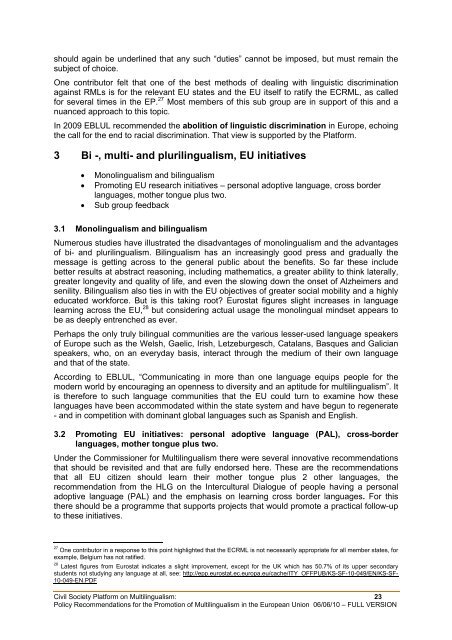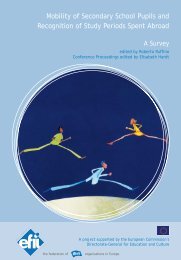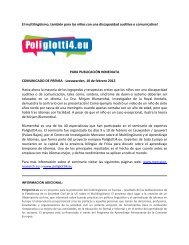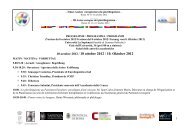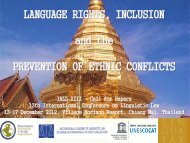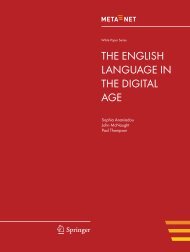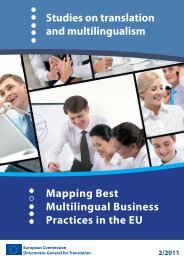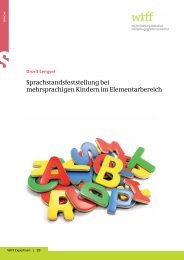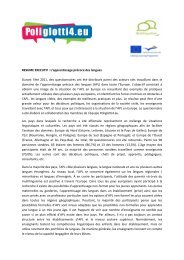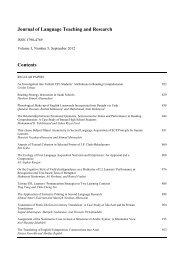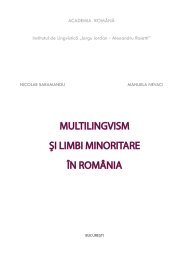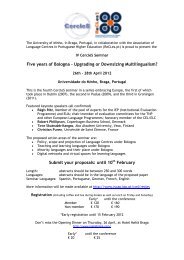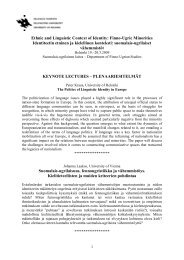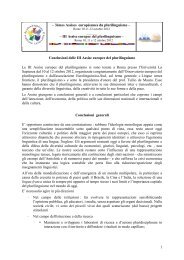FULL VERSION - European Commission - Europa
FULL VERSION - European Commission - Europa
FULL VERSION - European Commission - Europa
You also want an ePaper? Increase the reach of your titles
YUMPU automatically turns print PDFs into web optimized ePapers that Google loves.
should again be underlined that any such “duties” cannot be imposed, but must remain thesubject of choice.One contributor felt that one of the best methods of dealing with linguistic discriminationagainst RMLs is for the relevant EU states and the EU itself to ratify the ECRML, as calledfor several times in the EP. 27 Most members of this sub group are in support of this and anuanced approach to this topic.In 2009 EBLUL recommended the abolition of linguistic discrimination in Europe, echoingthe call for the end to racial discrimination. That view is supported by the Platform.3 Bi -, multi- and plurilingualism, EU initiativesMonolingualism and bilingualismPromoting EU research initiatives – personal adoptive language, cross borderlanguages, mother tongue plus two.Sub group feedback3.1 Monolingualism and bilingualismNumerous studies have illustrated the disadvantages of monolingualism and the advantagesof bi- and plurilingualism. Bilingualism has an increasingly good press and gradually themessage is getting across to the general public about the benefits. So far these includebetter results at abstract reasoning, including mathematics, a greater ability to think laterally,greater longevity and quality of life, and even the slowing down the onset of Alzheimers andsenility. Bilingualism also ties in with the EU objectives of greater social mobility and a highlyeducated workforce. But is this taking root? Eurostat figures slight increases in languagelearning across the EU, 28 but considering actual usage the monolingual mindset appears tobe as deeply entrenched as ever.Perhaps the only truly bilingual communities are the various lesser-used language speakersof Europe such as the Welsh, Gaelic, Irish, Letzeburgesch, Catalans, Basques and Galicianspeakers, who, on an everyday basis, interact through the medium of their own languageand that of the state.According to EBLUL, “Communicating in more than one language equips people for themodern world by encouraging an openness to diversity and an aptitude for multilingualism”. Itis therefore to such language communities that the EU could turn to examine how theselanguages have been accommodated within the state system and have begun to regenerate- and in competition with dominant global languages such as Spanish and English.3.2 Promoting EU initiatives: personal adoptive language (PAL), cross-borderlanguages, mother tongue plus two.Under the <strong>Commission</strong>er for Multilingualism there were several innovative recommendationsthat should be revisited and that are fully endorsed here. These are the recommendationsthat all EU citizen should learn their mother tongue plus 2 other languages, therecommendation from the HLG on the Intercultural Dialogue of people having a personaladoptive language (PAL) and the emphasis on learning cross border languages. For thisthere should be a programme that supports projects that would promote a practical follow-upto these initiatives.27One contributor in a response to this point highlighted that the ECRML is not necessarily appropriate for all member states, forexample, Belgium has not ratified.28Latest figures from Eurostat indicates a slight improvement, except for the UK which has 50.7% of its upper secondarystudents not studying any language at all, see: http://epp.eurostat.ec.europa.eu/cache/ITY_OFFPUB/KS-SF-10-049/EN/KS-SF-10-049-EN.PDFCivil Society Platform on Multilingualism: 23Policy Recommendations for the Promotion of Multilingualism in the <strong>European</strong> Union 06/06/10 – <strong>FULL</strong> <strong>VERSION</strong>


